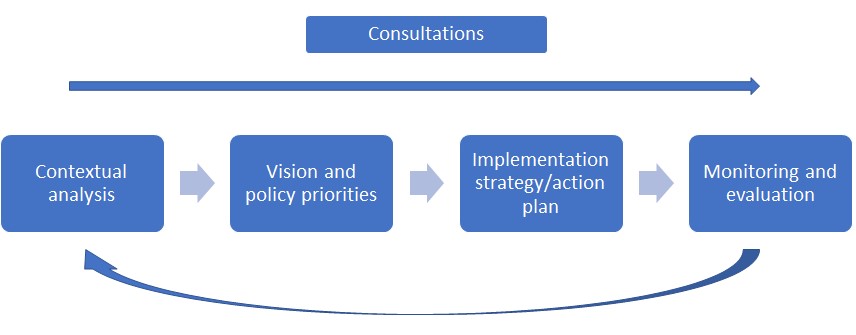LLL policy denotes an amalgamation of documents and processes – including legislation, policies, strategies and action plans – that explicitly contribute to a nationwide promotion of LLL.
LLL policy should be research-driven and evidence-based. The policy-making process should therefore be informed by contextual analysis, involving a review of existing legislation, policies, strategies and action plans pertaining to LLL, as well as relevant research. The contextual analysis should also map out demographic trends, social conditions, economic conditions, characteristics of the education system, the status of equity and inclusion (particularly with regard to women and vulnerable populations), and the interaction of all these factors.
LLL policy can be developed in different forms: by integrating a LLL perspective into sectoral policies or by developing a distinct, comprehensive LLL policy that cuts across different sectors. Sectoral policies developed from a LLL perspective are typically under the responsibility of a particular ministry (e.g. education, labour, social affairs) but may extend beyond that sector. Integrating a LLL perspective into sectoral policies means defining the skills and knowledge needed to achieve sectoral goals and defining how these can be developed through LLL among different groups in society. Measures included in sectoral policies with a LLL perspective may also facilitate pathways into and from other sectors (e.g. a labour policy supportive of non-linear transitions between work and education).
LLL policy also includes the development of a comprehensive LLL policy document or strategy, which typically cuts across different (sub-)sectors. It may be under the joint responsibility of several ministries or under the direct responsibility of the head of government (president, prime minister or equivalent). It should be guided by a shared vision and aligned with the overarching development goals of the country. This policy may serve as a statement for the national promotion of LLL, as well as a unifying document for diverse lifelong learning policies and initiatives that already exist in the country. This policy often refers to governance and financing arrangements and, though it might not provide an exhaustive account of learning initiatives across the country, it can bring cohesion to the national effort to promote LLL.
A LLL implementation strategy or action plan is often included in or directly follows the comprehensive LLL policy or strategy. Here, the key areas and topics for LLL implementation are specified with associated objectives, targets and indicators. The implementation strategy or action plan also details the LLL programmes to be designed, with stakeholder involvement, financing, resource mobilization and a timeline indicated.
Box 2.1. LLL in practiceA national policy framework from a lifelong learning perspective in ColombiaColombia provides a good example of designing an integrated public policy, in this case for early childhood care and education (ECCE). De Cero a Siempre (‘From zero to forever’) promotes the comprehensive development of children from birth until the age of six. Policy implementation follows an integrated approach, including the coordination of different sectors (the ministries of education, health and culture, and the Colombian Institute of Family Welfare) and stakeholders such as families, communities, civil society, academia, the private sector and NGOs. In addition, the policy involves territorial coordination at national, departmental and municipal levels. In recognizing the role of families in child development, De Cero a Siempre has developed strategies to change patterns and practices of child-rearing by training families. The programme has trained almost 11,000 tutors, who, in turn, have trained more than 150,000 families, improving the care of young children as a result. Another strategy includes the creation of reading rooms: cosy and friendly spaces designed to promote reading, literature and language development. Since 2013, over 300 of these freely accessible and inclusive spaces have been established in 145 municipalities across Colombia through public–private alliances. Sources: High Counselling for Special Programs, Office of the President, Republic of Colombia, 2013, 2018 |
To ensure progress in the implementation of LLL policies, a monitoring and evaluation (M&E) framework is needed. Such a framework defines the mechanisms and responsibilities for M&E and should include indicators for tracking targets. Given the breadth of LLL policy, the M&E framework may address the quality, quantity and/or equality of learning opportunities, building on existing data collection and monitoring activities, and leading to periodic reports on progress in LLL.
The entire LLL policy-making process is shaped by consultations with diverse groups of stakeholders such as government ministries, local leaders, institutions, representatives of the private sector, community groups, civil society organizations and learners themselves. This process should be continuous (used to refine all stages of the process) and deep (meaningful involvement rather than approval-seeking).
Based on this broad definition, several core components of LLL policy can be identified as a sequence (see Figure 2.1).
Figure 2.1. Core components of lifelong learning policy

Source: Elaborated by authors
The core components in this sequence are broadly defined in order to apply to complex LLL policies across diverse contexts. They should be reflected in any LLL policy-making process and relate to a number of key factors for effective LLL policy.
Defining LLL policy and the policy-making process
High Counselling for Special Programs. Office of the President, Republic of Colombia. 2013. Early childhood comprehensive care – Strategy political, technical and management fundamentals. [PDF] Bogotá, Republic of Colombia. Available at: http://www.deceroasiempre.gov.co/QuienesSomos/Documents/Political-Technical-and-Management-Fundamentals.pdf [Accessed 20 April 2020].
High Counselling for Special Programs. Office of the President, Republic of Colombia. 2018. Informe de Rendición Pública de Cuentas en Primera Infancia 2012–2017. [PDF] Bogotá, Republic of Colombia. Available at: http://www.deceroasiempre.gov.co/Prensa/CDocumentacionDocs/INFORME_DE_RENDICION_PUBLICA_DE_CUENTAS_EN_PRIMERA_INFANCIA_2012-2017.pdf [Accessed 20 April 2020].

